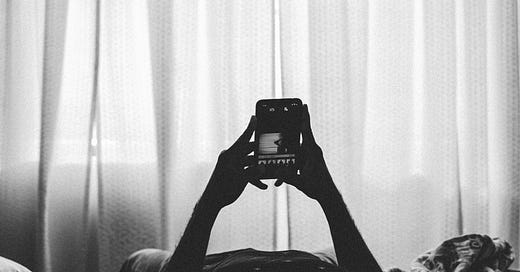Photo by Ahmed Nishaath on Unsplash
When you hear people discussing going back to work or returning to normal, do you get really excited or are you filled with dread? Do you crave constant social interactions, or do you want people to just leave you alone? Unless you define yourself on the extremes, the truth is likely somewhere in the middle.
This has been on my mind for a while, probably since the late fall when my team at work started considering the future and how it might look. I work in the Education Department of a large suburban synagogue, focusing largely on our part-time religious school program and family programs. We ask ourselves: what are our Covid-keepers? What are the takeaways from this crisis? How will our perspectives on Jewish supplemental education be different now? Our responses continue to evolve and may be a great topic for a future newsletter.
But what about for us personally? What do we want to keep from this time of forced resilience, experimentation and creativity, and what do we want to shed? I know that many people persevered through this as never before, but for me, feeling successful personally and professionally was something that took a tremendous amount of willpower, stamina and structural support, many of which I needed to put into place for myself. But I must admit that I have loved rarely having to put on work clothes or shoes.
While I have really missed the social connections from my various communities, I have not missed the constant obligations, the running around, the overscheduling that we would do. I like smaller backyard hangouts and talking to neighbors as they walk their dogs as I sit on my lawn watching the kids. What I would really like is to strip away the superficial concerns and focus on what’s really important: family, community, caring for others, health and love. I think part of the reason I feel this way is because I consider myself to be an introvert, and for many of us, social anxiety is real.
The Washington Post recently published an article about how introverts have done well through the pandemic and are not looking forward to being thrust back into the world of draining social interactions. “And now we’re returning to the pre-pandemic world, or as close as we can get. Like everyone else, introverts are excited about seeing family and close friends in person, dining in restaurants, traveling and all the other pleasures of a good life. But most are not interested in facing the forced small talk, the big parties, the noisy open offices and all the demands of extroverts who think more is more and introverts should try harder.”
I like that line especially because it acknowledges that our world isn’t really set up for people who need social time in smaller doses. Whereas I certainly miss interacting with members of my communities (many of whom are reading this right now; thank you!), it is often tiring after a while, and I find myself needing a quiet place to recharge.
I have been wondering if the Jewish textual tradition had encountered introverts and extroverts or distinguished between people in this way. I looked to Pirke Avot, also known as The Ethics of our Fathers/Ancestors, an ancient ethical work from the Mishnah dating around 200CE. It is full of so many profound verses that admonish us to focus our attention on the things that really matter during our time on earth. There is a particularly apt verse, 1:15, that relates to our conversation here, I believe: Shammai used to say: make your [study of the] Torah a fixed practice; speak little, but do much; and receive all [people] with a pleasant countenance. While study is a noble pursuit in its own right, how do you engage with those around you? According the great teacher, Shammai, counterpart to the wise Hillel, it is not necessary to engage in a lot of talk; what’s most important is what we do and how we show our faces to those around us. Sometimes talking is important but this verse teaches that our actions are more valuable, a very comforting thought for an introvert.
Introverts! I want you to be aware of the Quiet Revolution, a website by Susan Cain, author of Quiet: The Power of Introverts in a World That Can’t Stop Talking and Quiet Power: The Secret Strengths of Introverts.
If you have something to share about this topic, please add it here as a comment so we all may benefit.
Thank you!




Nicely said. I'm extroverted, for sure, but also have empathy. The return will be tough for many, and I've begun thinking how we will need to accomodate. The struggle will continue, that's all I know.
Love this (& Susan Cain's work! fun fact: she is a college classmate of one of our mutual friends at Adas!). One of my favorite lines of hers is that introverts spend so much of our energy trying to act more like extroverts, when really extroverts could benefit just as much from trying to act more like introverts--your post gives me hope that maybe the pandemic will make that two-way exchange more likely!